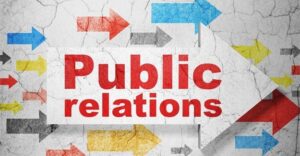Choosing a career in public relations (PR) can be thrilling and fulfilling. It is ideal for individuals who have a strong passion for communication, building relationships, and strategic storytelling.
Earning a relevant degree
A degree in public relations is not always necessary. However, having a degree in communications, public relations, journalism, marketing, or a related field can be beneficial. These degrees provide a solid foundation for a career in PR. Coursework in these fields usually includes media relations, strategic communication, writing, and research.
Gaining relevant experience
Internships, volunteer work, and entry-level positions in PR or related fields offer valuable hands-on experience. They help individuals pursuing public relations careers establish a strong foundation in the industry. Look for opportunities to work with PR agencies, nonprofits, or organizations with in-house PR departments. This experience allows for skill development, portfolio building, and industry networking.
Developing strong writing and communication skills
Excellent written and verbal communication skills are critical in the field of PR. Practice writing press releases, media pitches, blog posts, and other forms of communication to improve writing. Additionally, work on public speaking and presentation skills to effectively convey messages and represent clients or organizations in various settings.
Building a network
Networking is vital in order to have success in the PR industry. You can enhance your professional network by attending industry events, joining professional organizations such as the Public Relations Society of America (PRSA), and connecting with professionals in the field through social media platforms like LinkedIn. Building relationships with PR practitioners can provide valuable insights, mentorship opportunities, and potential job leads.
Staying on top of industry trends
PR is a constantly evolving field. Staying up to date with industry trends and developments is essential. To enhance knowledge and demonstrate commitment to professional growth, people pursuing careers in public relations should read industry publications, follow PR blogs, and engage in continuing education opportunities.
Developing a strong digital presence
In today’s digital age, having a strong online presence is crucial. Create a professional website or online portfolio to showcase work, skills, and expertise. Maintain an active presence on professional networking sites like LinkedIn and consider starting a blog or contributing articles to industry publications. This helps establish individuals as thought leaders in the field.
Showcasing skills
When applying for PR positions, make sure to highlight relevant skills and experiences on the resume and cover letter. Individuals can emphasize their ability to build relationships, manage multiple projects, handle deadlines, and work effectively in a team. Provide examples of successful PR campaigns or projects from the past, and include any measurable results or outcomes.
Being proactive
Don’t wait for job opportunities to come knocking. The most effective job search when pursuing a public relations career is to be proactive. It’s best to research PR agencies, organizations, and companies that align with the individual’s interests and career goals. Reach out to professionals in the industry for informational interviews or job shadowing opportunities. Attend career fairs and industry events to meet potential employers and learn about job openings.
Staying flexible and open to entry-level positions
Starting a public relations career may involve entry-level positions or internships that provide valuable learning experiences. Be willing to take on these opportunities and be proactive in seeking growth and advancement within the organization. Look for ways to contribute beyond the assigned tasks and demonstrate value to the team.
Continuously learning and adapting
PR is a dynamic field, so it’s essential to stay adaptable and continuously learn and adapt to new trends, technologies, and strategies. Seek professional development opportunities, attend workshops or webinars, and consider pursuing certifications, such as the Accreditation in Public Relations (APR). This helps to enhance the skills of anyone pursuing a public relations career and demonstrate their commitment to professional excellence.




